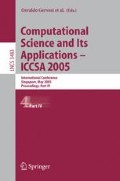Abstract
Production planning problems play a vital role in the supply chain management. The methodology of production planning problem can provide the quantity of production and the workforce level at each production plant to fulfil market demand. This paper develops a stochastic programming model with additional constraints. A set of data from a multinational lingerie company in Hong Kong is used to demonstrate the robustness and effectiveness of the proposed model.
Access this chapter
Tax calculation will be finalised at checkout
Purchases are for personal use only
Preview
Unable to display preview. Download preview PDF.
References
Baykasoglu, A.: MOAPPS 1.0: Aggregate Production Planning Using the Multiple-Objective Tabu Search. International Journal of Production Research 39, 3685–3702 (2001)
Dantzig, G.B.: Linear Programming Under Uncertainty. Management Science 1, 197–206 (1955)
Hung, Y.F., Hu, Y.C.: Solving Mixed Integer Programming Production Planning Problems with Setups by Shadow Price Information. Computers and Operations Research 25, 1027–1042 (1998)
Hung, Y.F., Shih, C.C., Chen, C.P.: Evolutionary Algorithms for Production Planning Problems with Setup Decisions. Journal of the Operational Research Society 50, 857–866 (1999)
Masud, A.S.M., Hwang, C.L.: An Aggregate Production Planning Model and Application of Three Multiple Objective Decision Methods. International Journal of Production Research 18, 741–752 (1980)
Mazzola, J.B., Neebe, A.W., Rump, C.M.: Multiproduct Production Planning in the Presence of Work-Force Learning. European Journal of Operational Research 10, 336–356 (1998)
Nam, S.J., Logendran, R.: Aggregate Production Planning – A Survey of Models and Methodologies. European Journal of Operational Research 61, 255–272 (1992)
Ozdamar, L., Bozyel, M.A., Birbil, S.I.: A Hierarchical Decision Support System for Production Planning (with Case Study). European Journal of Operational Research 104, 403–422 (1998)
Wang, D., Fang, S.C.: A Genetics-Based Approach for Aggregated Production Planning in a Fuzzy Environment. IEEE Transactions on Systems, Man, and Cybernetics – Part A: Systems and Human 27, 636–645 (1997)
Author information
Authors and Affiliations
Editor information
Editors and Affiliations
Rights and permissions
Copyright information
© 2005 Springer-Verlag Berlin Heidelberg
About this paper
Cite this paper
Lai, K.K., Leung, S.C.H., Wu, Y. (2005). A Two-Stage Recourse Model for Production Planning with Stochastic Demand. In: Gervasi, O., et al. Computational Science and Its Applications – ICCSA 2005. ICCSA 2005. Lecture Notes in Computer Science, vol 3483. Springer, Berlin, Heidelberg. https://doi.org/10.1007/11424925_28
Download citation
DOI: https://doi.org/10.1007/11424925_28
Publisher Name: Springer, Berlin, Heidelberg
Print ISBN: 978-3-540-25863-6
Online ISBN: 978-3-540-32309-9
eBook Packages: Computer ScienceComputer Science (R0)

